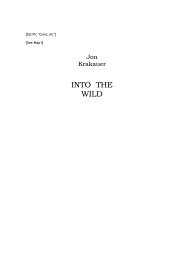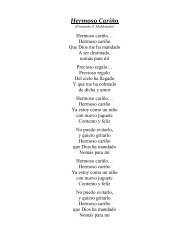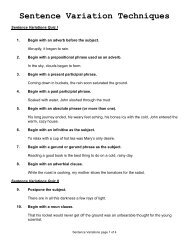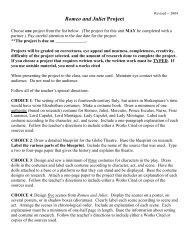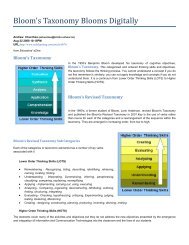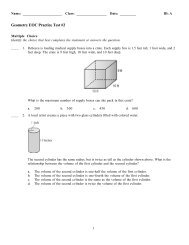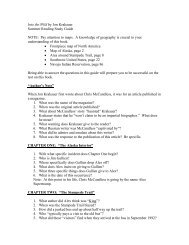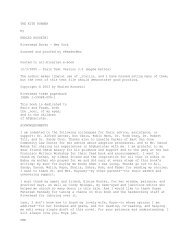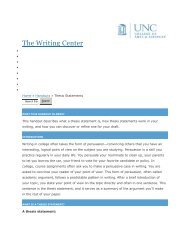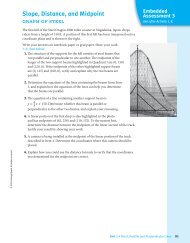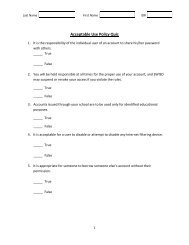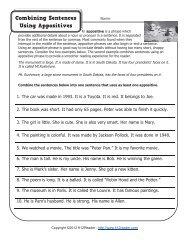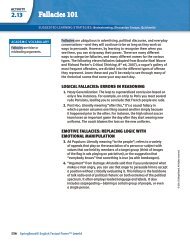Unit 1.pdf - Southwest High School
Unit 1.pdf - Southwest High School
Unit 1.pdf - Southwest High School
Create successful ePaper yourself
Turn your PDF publications into a flip-book with our unique Google optimized e-Paper software.
Activity 1.20<br />
continued<br />
© 2011 College Board. All rights reserved.<br />
men have accused le sale negre—behind my back—of stealing wood and<br />
there is already in the eyes of some of them the peculiar, intent, paranoiac<br />
malevolence which one sometimes surprises in the eyes of American<br />
white men when, out walking with their Sunday girl, they see a Negro<br />
male approach.<br />
14 There is a dreadful abyss between the streets of this village and the<br />
Chunk<br />
streets of the city in which I was born, between the children who shout<br />
6<br />
Neger! today and those who shouted Nigger! yesterday—the abyss is<br />
experience, the American experience. The syllable hurled behind me<br />
today expresses, above all, wonder: I am a stranger here. But I am not a<br />
stranger in America and the same syllable riding on the American air<br />
expresses the war my presence has occasioned in the American soul.<br />
15 For this village brings home to me this fact: that there was a day, and<br />
not really a very distant day, when Americans were scarcely Americans at<br />
all but discontented Europeans, facing a great unconquered continent and<br />
strolling, say, into a marketplace and seeing black men for the first time.<br />
The shock this spectacle afforded is suggested, surely, by the promptness<br />
with which they decided that these black men were not really men but<br />
cattle. It is true that the necessity on the part of the settlers of the New<br />
World of reconciling their moral assumptions with the fact—and the<br />
necessity—of slavery enhanced immensely the charm of this idea, and it<br />
is also true that this idea expresses, with a truly American bluntness, the<br />
attitude which to varying extents all masters have had toward all slaves.<br />
16 But between all former slaves and slave-owners and the drama which<br />
Chunk<br />
begins for Americans over three hundred years ago at Jamestown, there<br />
7<br />
are at least two differences to be observed. The American Negro slave<br />
could not suppose, for one thing, as slaves in past epochs had supposed<br />
and often done, that he would ever be able to wrest the power from<br />
his master’s hands. This was a supposition 12 which the modern era,<br />
which was to bring about such vast changes in the aims and dimensions<br />
of power, put to death; it only begins, in unprecedented fashion, and<br />
with dreadful implications, to be resurrected today. But even had this<br />
supposition persisted with undiminished force, the American Negro<br />
slave could not have used it to lend his condition dignity, for the reason<br />
that this supposition rests on another: that the slave in exile yet remains<br />
related to his past, has some means—if only in memory—of revering<br />
and sustaining the forms of his former life, is able, in short, to maintain<br />
his identity.<br />
17 This was not the case with the American Negro slave. He is unique<br />
among the black men of the world in that his past was taken from<br />
him, almost literally, at one blow. One wonders what on earth the first<br />
slave found to say to the first dark child he bore. I am told that there<br />
11<br />
mėtier: profession<br />
12<br />
supposition: belief<br />
My Notes<br />
<strong>Unit</strong> 1 • Perception Is Everything 75



